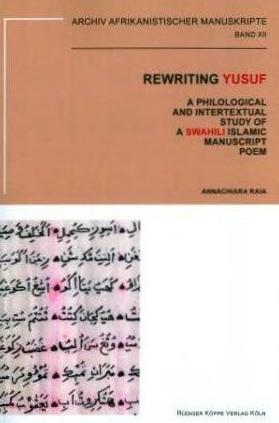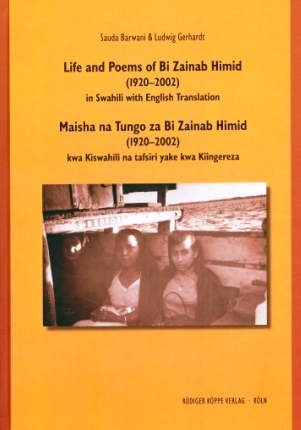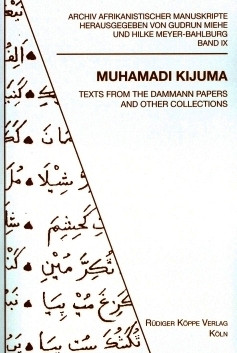


Rewriting Yusuf
A Philological and Intertextual Study of a Swahili Islamic Manuscript Poem – with a foreword by Farouk Topan
Author: Annachiara Raia. With a preface by: Farouk Topan. Series edited by: Clarissa Vierke, Gudrun Miehe.
Series: AAM Archiv afrikanistischer Manuskripte Volume 12
202020 pp. Roman, 664 pp.
1 map, 3 colour photos, 2 colour illustrations, 81 colour facsimile-reproductions, 32 b/w facsimile-reproductions, 1 genealogical chart, numerous figures and tables
Text language(s): English
Format: 160 x 240 mm
1320 g
Paperback
€ 69.80
Buy 'Rewriting Yusuf' as a downloadable PDF document directly from our online shop »
Order 'Rewriting Yusuf' as print edition »
This work centres on a long narrative poem, the Utendi wa Yusufu. This is the Swahili version of the story of Joseph, son of Jacob, as he is called in the Old Testament, or the Arabic Yūsuf ibn Ya‘qūb, revered by both Judeo-Christian and Muslim communities. The story has been disseminated all over the world, translated into many different languages and adapted into various genres throughout the centuries, making it one of the most widely-travelled stories of mankind. The story also made its way to the East African coast and became widespread at the beginning of the twentieth century and probably even in the nineteenth. In the context of this work, I will focus on the earliest surviving East African versions of the story that we have, which have been preserved in manuscripts in Arabic script.
In its core, the present study offers the textual history, critical edition and translation of the Utendi wa Yusufu. The poem has been circulated in several manuscripts in Arabic script. Although I will give an overview of all the manuscript versions available, my text edition is based on three manuscripts penned by two different scribes. The manuscripts have never been transliterated, commented on or translated – my work is the first critical text edition of the poem.
The second aim of this monograph is to consider the aspect of adaptation: how is the story, which has been so widely circulated, re-narrated in East Africa and from a Swahili coastal perspective? How did it become part of Swahili intellectual history? How did the Swahili poet transform the text to make it his own? How does the Swahili text differ from the presumably similar text of the Qur’ān or the Qiṣaṣ? Since the story has been so popular and widely diffused throughout the whole area of the Indian Ocean, and translated and adapted over centuries and across continents, the Swahili ‘Hadithi ya Yusufu’ then makes for a riveting case study of appropriation: it is a specific text in a relatively well-known genre, the utendi, which can tell us more about the ‘Swahili’ form of ‘translating’ ‘foreign’ stories into local context. This study of appropriation is text-oriented and has concentrated on two principal intertextual sources of the Utendi wa Yusufu, which are both part of Islamic tradition but pertain to two different genres: firstly, the Holy Qur’ān, and more specifically, the Sūrat Yūsuf, and secondly, the Qiṣaṣ al-Anbiyā, a widely-known cycle of literature about the prophets who lived prior to Muhammad.
There have been a number of hints at the intertextual links between the Swahili poem of the ‘Utendi wa Yusufu’ and these Arabic sources. However, my study makes the first attempt to thoroughly examine the interrelationship between the Swahili poem and the two texts. As I will show, focusing on the comparison, the Swahili text differs from both texts quite substantially, both with respect to the presence and absence of motifs, as well as the depiction of the story and its style. Both the liberty that the poet takes in amplifying the text, but also the utendi’s style, its epic length and its episodic structure have a decisive bearing on the story. Finally, I will also consider the implications of the specific modes of adaptation found in the utendi. What do they reveal about the poet’s attitude towards the text?
Under these links you will find further Swahili text editions and analyses, as well as African oral literature from various countries:
Accompanying material:
- Chanter l’existence
(ISBN 978-3-89645-287-0 ) - Framing Texts – Framing Social Spaces
(ISBN 978-3-89645-742-4 ) - Kala Shairi
(ISBN 978-3-89645-171-2 ) - Life and Poems of Bi Zainab Himid (1920–2002) / Maisha na Tungo za Bi Zainab Himid (1920–2002)
(ISBN 978-3-89645-286-3 ) - Liyongo Songs
(ISBN 978-3-89645-172-9 ) - Muhamadi Kijuma
(ISBN 978-3-89645-174-3 ) - Swahili Grundkurs
(ISBN 978-3-89645-002-9 ) - Swahili-Handbuch
(ISBN 978-3-927620-06-3 ) - The Voice of the Text and its Body
(ISBN 978-3-89645-739-4 ) - Uzinduzi [Die Vernissage]
(ISBN 978-3-89645-191-0 ) - Vamps and Victims
(ISBN 978-3-927620-74-2 ) - Wörterbuch Swahili-Deutsch
(ISBN 978-3-89645-415-7 )
Cross-reference:
- African Languages in Global Society / Les langues africaines à l’heure de la mondialisation / Lugha za Kiafrika kwenye enzi ya utandawazi
(ISBN 978-3-89645-259-7 ) - Contes des Bakas (Sud-Est Cameroun)
(ISBN 978-3-89645-272-6 ) - Die Figur des Oger in der traditionellen Literatur und Lebenswelt der Pokomo in Ost-Kenya
(ISBN 978-3-927620-60-5 ) - Erzählte Kultur und Erzählkultur bei den Mwera in Südost-Tansania
(ISBN 978-3-89645-268-9 ) - Finding Female Voice
(ISBN 978-3-89645-282-5 ) - Folktales of the Kxoe in the West Caprivi
(ISBN 978-3-89645-081-4 ) - Imagination und Realität in westafrikanischen Erzählungen
(ISBN 978-3-89645-201-6 ) - Liedtexte der Dama, Südwestafrika/Namibia
(ISBN 978-3-89645-354-9 ) - Mandinka Spoken Art
(ISBN 978-3-927620-63-6 ) - Motivforschung in Volkserzählungen der Kanuri (Tschadsee-Region)
(ISBN 978-3-89645-273-3 ) - Narrations of the Kavango
(ISBN 978-3-89645-279-5 ) - Oromo Oral Poetry Seen from Within
(ISBN 978-3-89645-276-4 ) - Perpetuating the Politics of Praise
(ISBN 978-3-89645-213-9 ) - The Voice of the Elders
(ISBN 978-3-89645-278-8 ) - Unser Leben vor der Revolution und danach – Maisha yetu kabla ya mapinduzi na baadaye
(ISBN 978-3-89645-274-0 ) - Wörterbuch Deutsch-Swahili
(ISBN 978-3-89645-346-4 )
| « back | Print version | [top] |
 Books
Books Audio
Audio Biographies
Biographies Series
Series Festschrifts
Festschrifts Journals
Journals